
On April 15, Cook appeared in photos in local newspapers meeting Vietnamese singers and content creators, enjoying egg coffee, eating sunflower seeds, walking around Hoan Kiem Lake in Hanoi, visiting a school that used iPads, and meeting Vietnamese Prime Minister Pham Minh Chinh.
Cook came to Vietnam, one of Apple's top manufacturing hubs, to meet users and boost supplier ties.
Vietnam has emerged as a large market and production center for Apple, which is trying to diversify its production lines to mitigate impact caused by geopolitical uncertainties.
Soon after arriving in Hanoi, Cook said: “Vietnam is a vibrant and beautiful country. I’m excited to be here connecting with students, innovators and customers, understanding the diversity of how they use our products to do extraordinary things."
Last month, Cook flew to China to emphasize the importance of the mainland market, and its importance in Apple’s production and supply chain.
However, the escalation of geopolitical tensions between Washington and Beijing has forced the technology firm with the largest capitalization value in the world to restructure its production and supply chain.
IDC’s report on the global smartphone market in the first quarter of 2024 showed that Apple was facing problems in the first three months of the year with a decline of 10 percent compared with the same period last year.
Strategic relocation
Apple last year for the first time relocated its resources for iPad development to Vietnam. Apple’s component suppliers have also been relocating their manufacturing to countries such as Mexico, Malaysia, Thailand, Indonesia, Vietnam and India.
At a working session with Vietnamese Prime Minister Pham Minh Chinh in September 2023, Apple’s vice president Nick Ammann commented that Vietnam is a very important market and production area for Apple, and affirmed that the technology giant wants to participate in developing and training a workforce here, especially in hardware techniques.
Also at the meeting, Chinh asked Apple to continue to expand cooperation and investment, and to increase locally made content in Vietnam. He also called on Apple to fulfill the role of a bridge, bringing American companies and suppliers to Vietnam to invest, and to help local enterprises join the global supply chain.
He suggested that Apple could give consultancy to Vietnam’s National Innovation Center on building an R&D center with focus on digital transformation.
FT reported that Apple is cooperating with BYD, the Chinese iPad assembler, to relocate resources to design and develop new products to Vietnam.
Meanwhile, Luxshare Precision Industry, another partner of Apple, began investing in Vietnam in 2019 and is implementing projects capitalized at hundreds of million of dollars, building workshops to manufacture and assemble cables, communications components, touch pens, smart positioning cards and smartwatches in Nghe An and Bac Giang provinces.
Other Apple partners from Taiwan (China), including Quanta Computer and Compal Electronics, have set up factories in Vietnam.
A report found that Apple’s vendors, such as Luxshare, Foxconn, Compal and GoerTek, operate 32 factories in Vietnam, employing 160,000 people.
According to Reuters, as of the fourth quarter of 2023, Apple had completed the relocation of 11 audio component manufacturing facilities to Vietnam, which marked a strategic change in the global supply chain.
Meanwhile, Inventec, the Taiwanese supplier for Apple, received a license for its hi-tech project in HANSSIP in Phu Xuyen, Hanoi.
Benefits for Vietnamese consumers
JPMorgan estimated that Apple will relocate production of 20 percent of iPads, 5 percent of MacBooks, 20 percent of Apple Watches, and 65 percent of AirPods to Vietnam by 2025.
In May 2023, Apple officially set up an online shop in Vietnam, allowing Vietnamese consumers to buy its products directly from the company. Vietnam is the sixth country in Southeast Asia with an Online Apple Store. The iPhone 15 series was available in Vietnam just two weeks after the official launch.
Trong Dat